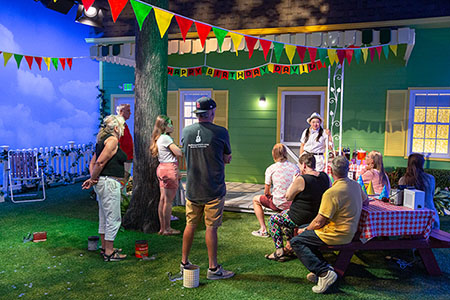(Above) Yellow “caution” tape blocks access to the Chicago Riverwalk from Wabash Avenue on April 18, 2013. To ease flooding, the river was re-reversed and what Friends of the Chicago River described as a “sewer-laden Chicago River full of trash” was routed into Lake Michigan. This happens about once a year when the existing system reaches capacity. (Click on image to view larger version.) Flood control project clears legal hurdle Jan. 13, 2014 – A federal judge has approved an agreement reached two years ago that will allow the Chicago area’s flood abatement agency to continue its massive Tunnel and Reservoir Plan – or “TARP” for short. On January 6, Judge George M. Marovich formally approved the agreement reached in December 2011 between the United States District Court and the Metropolitan Water Reclamation District of Greater Chicago. On the same day the U.S. government sued MWRD for alleged violations of the Clean Water Act, it filed a proposed agreement. It took two years to allow for and consider public comment on the proposal. Environmental groups – including Alliance for the Great Lakes, Sierra Club, and Prairie Rivers Network – were concerned about how long the project will take and whether it will keep enough storm water from flowing into the sewer system during storms. The agreement includes fines. MWRD will have to pay $350,000 to the federal government and $675,000 to the state. One of the largest civil engineering projects ever Judge Marovich called the project “impressive, not unreasonable.” “Tremendous public works projects can take a significant amount of time,” he wrote in his opinion and ruling. “TARP is no small project. It has involved creating more than 100 miles of tunnels and mining rough holes that will eventually be large enough to hold 17.5 billion gallons of water. By the time TARP is finished, MWRD will have added an average of 323 million gallons of storage capacity per year, which is an average of 885,000 gallons per day of additional storage capacity.” According to MWRD, the enforceable schedule approved by Marovich for implementing TARP will “result in a significant decrease in the volume of water discharged to the waterways from combined sewer overflows in Cook County, along with dramatically reducing the potential for flooding.”
TARP is a series of 109 miles of tunnels and three large reservoirs, costing $3 billion so far, that will capture and store storm and waste water in the Chicago area until it can be treated, keeping it out of streets, basements, and Lake Michigan. Work on the project will continue at least until 2029. Read the memorandum opinion and order… |















